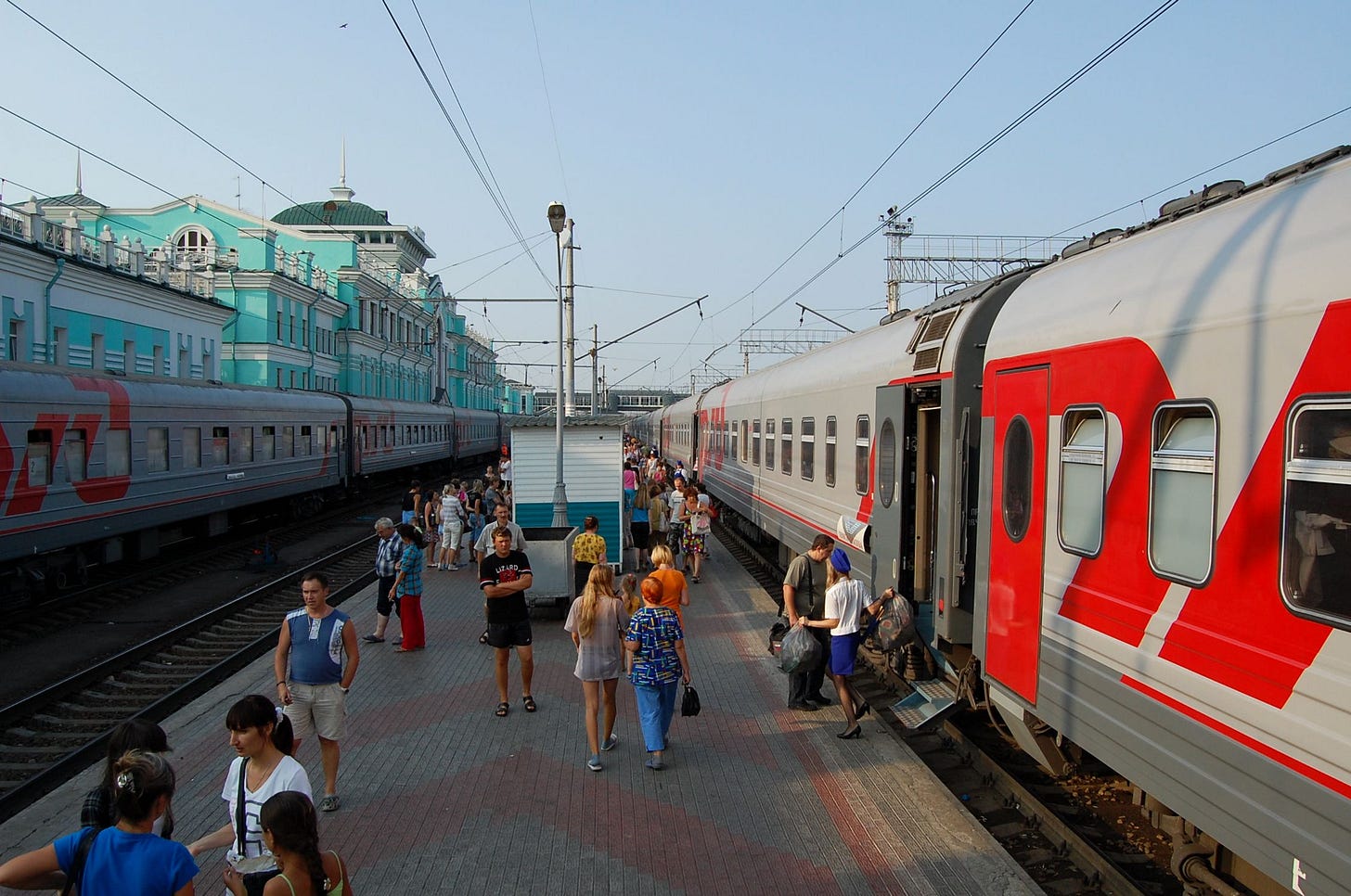
The longest train journey I ever took began as a joke. It was 2007, our time in Shanghai was coming to an end, and we were planning our departure. “Why don’t we travel by the Trans-Siberian Express?” suggested my 13 year-old son. He later admitted the suggestion was mostly in jest. But somehow the idea stuck, preparations were made, and in mid-July we were ready to leave. 1
The prospect of such a long journey by train was daunting yet also exciting; I’ve mentioned my own fondness for travelling by train here. But perhaps another reason why I favoured the idea was that it avoided another long flight. This was particularly important for me then because in January of that year I’d flown to England from China for my eldest brother’s funeral. Another flight would bring memories of that bitter journey.
As the train pulled slowly out of Beijing, four years of relentless work in China – but also endless optimism and frequent excitement – began to slip into the past. What I expected to be four quieter years in Ankara, my next posting, was a future that didn’t yet exist. The quiet erasure of the train journey had begun.
We’d paid for a sleeping compartment just for us as a family, so as we stowed our luggage into the ancient train’s designated crevices for such purposes, it felt snug, secure even. Washing facilities were in the corridor outside and were basic, but this was an adventure, I told myself, and a grubby lack of privacy seemed to come with that.
Soon, though, our sense of relative self-containment was eroded. We could hear noises along the corridor as passengers from another part of the train began to explore our section. Soon came a knock on the door. A young Chinese man, perhaps in his thirties, scruffily dressed, and with a large canvas bag over his shoulder, had a favour to ask. He had too much luggage for his cramped compartment, he said, and could we look after his bag until we crossed the border into Mongolia?
It wasn’t hard to work out what this meant. I’d flown enough times from South America to Europe to be warned dozens of times about the danger of traffickers slipping parcels into your hand baggage to convert you into an unknowing mule. This was probably not drugs and certainly wasn’t a sophisticated operation, but it was definitely smuggling.
I’d met some likeable “contrabandistas” importing white goods in South America. And long before the vicious drug trade became so prominent, smuggling used to have a vaguely romantic appeal. In my home county of Devon, smuggling was almost an acknowledged occupation a couple of centuries ago, and the trace of the practice still endures in certain place names.
And for more personal reasons, I felt a vague and nostalgic sympathy for these small-time smugglers. At the age of 13, I’d been enchanted by J Meade Falkner’s novel, Moonfleet. This beautiful book had set me firmly against “the excisemen”. After all, my childish self had thought, didn’t people have the right to trade goods without these onerous taxes being levied?
But the adult me, cautious and aware that an arrest in Mongolia or Russia for smuggling might not be the best way to start this new chapter in life, said “no”. And it wasn’t long before I realised that the train was full of smugglers, all looking for places to stash their contraband in places away from the eyes of customs officials. We’d have to be on our guard.
The departure was in the evening, and after eating an improvised dinner of pot noodles and snacks – we were trying to avoid the relative expense of the dining car – we turned in for the night in our bunks. Outside, under a glittering moon, the shimmering expanse of the Gobi desert soon became visible. The sight of the endless dunes and low hills stretching before us was transfixing, and I thought it alone was worth all the effort and expense of the journey.
A little later, just as sleep began to fall upon us, the beauty of the desert took on an almost surreal aspect as I gazed upon hundreds of tanks, ghostly husks of metal in the moonlight. Their turrets were all aligned and pointing to enemies invisible under the night sky. In the morning, I wondered if I’d dreamt the whole thing. (I don’t think I had.)
As we were about to cross into Mongolia in the early hours, we were awakened by loud clanking sounds and the realisation that the train had stopped. We stayed there for about four hours. Not only did we have our passports taken away for inspection, but we all had to wait for the train to be prepared to run on the different gauge of track used in Mongolia and Russia, something called a bogie exchange.
I smiled to think of how my train-loving uncle (who has a replica steam engine running in his garden) would have loved this moment, but also how he would have probably also hated the whole experience – I’m not sure he’s ever ventured outside of the UK.
What I remember most about our brief stop at Ulaanbaatar, the Mongolian capital, is the dust. We got out to stretch our legs on the station platform, and there was dust or fine sand covering every surface. I was already familiar with the spring storms that brought fine particles in the atmosphere from the Gobi and deposited them across other parts of China as well as Korea and Japan – I’d experienced this periodically in Shanghai. Now I realised that the dust must be a constant feature of life in parts of Mongolia.
But the sand-covered surfaces of the capital soon gave way to the beautiful rolling prairies of northern Mongolia, an unexpected delight as we headed to the Russian border and Southern Siberia. One possibility that had been offered to us when arranging the trip was to have a break in the journey in Mongolia to explore this huge country. The sight of the beautiful landscape made me regret we hadn’t taken this option.
Instead, we’d chosen to stay near Lake Baikal.
The oldest existing freshwater lake on Earth and the deepest continental body of water, Baikal contains more water than 22% of the world’s fresh surface water – that’s apparently more than all of the North American Great Lakes combined. We arrived via a stopover at Irkutsk and then a relatively short drive to the Lake. We tingled with excitement at the prospect. All these superlatives had made it an irresistible destination for us.
But it turned out to be, for me at least, a huge disappointment. The location, not chosen by us, was a small settlement on the lake’s rocky shore. Looking at the clear waters of the lake, I tried to imagine the magnitude of this vast geographical structure.
However, to my mind, probably too accustomed to Turner paintings and beguiled for years by the picturesque landscapes of other European painters, the scene itself seemed to lack grandeur. It was basically a rocky shore, a barren strand, on a big expanse of water. And I don’t remember seeing a single bird, let alone any of the other unique wildlife the region promises, such as the Baikal seal. I felt it could have been a shoreline anywhere.
It was not, as Larkin once said in another context, the place’s fault. “Nothing, like something, happens anywhere,” he said. And here, certainly, a kind of nothingness pervaded the environment. It feels unkind to say that. But my sense of the place’s desperate emptiness was enhanced by a brief visit to the only shop in the tiny village we were staying in. It had two sections. One was for general provisions and groceries, where I noticed a lack of fresh produce.
When I wandered into the second section, I seemed to find the answer to a question that had been nagging at me since our arrival in this tiny lakeside village. What did people do here in the bitter cold and short days of winter?
The room was stacked from floor to ceiling with bottles of vodka.
A 2014 report from the University of Oxford declared, “Vodka is the main cause of the high and sharply fluctuating death rates in Russia.” In those days, the report said, “25% of all Russian men die before the age of 55 years, compared with only 7% of UK men. The difference is due mostly to alcohol and cigarettes.”
Since then, the situation has improved, it seems, though drinking is still a significant issue. And the image of the only shop for many miles giving over half its space to vodka left me with a lasting impression of the reality of winter life in the area.
Irkutsk, on the other hand, where we spent a brief afternoon while waiting to catch our train to Moscow, was a beautiful surprise. The welcoming architecture and this university city’s apparent roots in education both impressed me. In the Siberian sun the city seemed to shine in defiance of its bleak surroundings, and the inhabitants blinked in pleased disbelief at the balm of the afternoon light. I wished I’d stayed there and not at Baikal.
What I most remember of the journey from Irkutsk to Moscow was a sense of speed. I’ve travelled on much faster trains, but the spectacular cacophony of speeding metal over the rails as we hurtled past Yekaterinburg and on to Moscow gave an impressive sense of high velocity. The effect was that of a thousand metal hooves galloping on a metal way into the sky, a millipede Pegasus rampaging through the starry Siberian night.
Along the way we admired the endless green ocean that the magnificent summer grasslands resemble. And occasionally we passed the rusting hulks of long-abandoned factories, startlingly beautiful in their timeless modernity and with their jagged, brittle and exotic industrial shapes, now turned into the untended and unintended monuments of long-forgotten economic plans.
The days passed quickly; the world passed us by quickly, but we remained in our bubble of travelling time, momentarily free from the past or future. For long periods I read – a lengthy Russian novel, of course; Anna Karenina. I had just come to the celebrated haymaking scene when I chanced to look up and saw a small group of farmworkers in a field. They could have been descendants of those in the story, I fancifully thought. I felt that the two journeys, the mental one through the book and the physical one across the endless Eurasian continent, had momentarily converged.
Eurasia is not, of course, endless, even if it can seem like it. Unfortunately, neither were our resources. In an error of planning, I’d underestimated how much food and cash we’d need. A couple of days out from Moscow, we were running low on both. A credit card payment was theoretically possible, but the fragile connection available to the 2007 version of the internet made that for the most part a practical impossibility. We managed a splurge in the dining car in a moment of connectivity, but otherwise I started to ration my own food. Despite the enforced lack of real exercise, I think I lost a couple of kilos on the trip.
Arriving in Moscow’s grand station like a modern-day Zhivago family was exciting and exhausting. At least we had no jetlag, so we were able to collect our luggage without the usual grogginess that comes after a long-haul flight and negotiate the ancient but rather fine metro system to our hotel. After a day’s sightseeing (mostly wandering around Red Square), we were ready to fly to Paris and then continue by train to southwest France. This journey ended in a classic anticlimax when my suitcase, which had stayed with me on this epic journey across half the world by land, was lost at Charles de Gaulle Airport.
Although the passage of time in the outside world had seemed to be suspended for the duration of the train journey, and we barely knew which day it was, there was one moment when its implacable march intruded.
As we reached the Russian border late in the Mongolian night, we were awakened by the sound of knocking on doors further down the carriage. Officials were checking passports on the train, which at least meant we didn’t have to disembark.
However, when our carriage door opened and an impressively tall border guard appeared with her colleagues on either side, it felt like a moment of challenge. “Passports, please,” was the only gruff greeting she gave. And the atmosphere chilled into a threat as she stared at my passport for a long time with a stern expression on her face. What detail had caught her attention there? For the second time on the journey, the spectre of summary arrest arose in my mind.
She then looked at her watch. Nervously, I looked at mine. It was already well past midnight. Then the guard handed me back my passport. As she did so, she pointed to its data page.
“Happy birthday,” she said, with half a smile, reminding me of that overlooked anniversary, before she turned and left without another word.
The Trans-Siberian is actually between Moscow and Vladivostok. We joined it via the Trans-Mongolian Railway, which travels from Beijing and crosses Mongolia.








Lovely stuff Jeffrey. You really brought the trip to life and I travelled along with you on a train journey I’d love to take myself. My only experience of Russian railways was a slow steam train, overnight from Leningrad to Moscow on a very warm night in August 1970. I spent quite a bit of time wandering the corridors of the sleeper carriages. The train stopped frequently deep in dark forests with stars overhead. The steam engine clanked and hissed while waiting and I felt like Tom Courtney’s character in Dr Zhivago without the eyepatch.
Jeffrey, what an extraordinary journey. A true adventure, especially as seen through your eyes. You bring both curiosity and a sensibility informed by personal experience and knowledge of history, culture, and literature. The connection between the smugglers on the train and those in Devon is a fascinating detail. Reading Tolstoy, noting what is unchanged from his time (and of course, there’s the haunting specter of Anna’s death) seems exactly like what an educated traveler would do. Exquisite writing. Wishing you a very belated happy birthday.